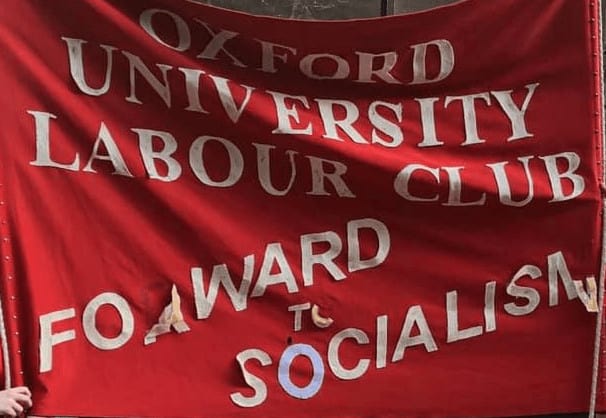| By Grace Davis, Gale Ambassador at the University of Oxford |
The term “primary sources” gives me slightly traumatic flashbacks to my History GCSE when, as a baby academic, I had to explain how a picture can present a biased interpretation of the world. Now, a more grown-up (though not fully fledged) academic, the idea of “primary sources” is not as scary, but I often still find myself shying away from using them in my academic work. I’m happy to announce, however, that primary sources can be used for more than your university essays! Gale Primary Sources includes millions of pages of primary sources on almost every topic imaginable, including your hobbies and topics of interest beyond the lecture theatre. Once you start unearthing primary sources about things that fascinate you outside your degree, you may just develop greater confidence and familiarity with them and start feeling more comfortable incorporating them into university work too!
Research your student societies
Whilst historical archives are undoubtedly useful for your studies, many students spend a significant proportion of their university life enjoying activities outside their degree. I must admit that I am the kind of person who has often fallen into the trap of dedicating a great deal of precious time (more of which should have been spent on university work!) to student societies. Therefore, it is unsurprising that, as I sat down in the library in an attempt to revise for my pre-term exams – coffee in hand and still not quite awake, as I was still readjusting to university after my holiday sleep schedule – I instead found myself searching through the Gale archives for interesting facts about the society of which I was recently co-chair: the Oxford University Labour Club. And it seems for those who, like me, prefer prioritising just about anything over your degree, this is still an exciting way to make use of the great content in Gale Primary Sources.
Oxford University Labour Club
Oxford University Labour Club is a particularly interesting student society with a vast amount of history. This year the club will be celebrating its 100th birthday. With centenary events planned to recount the history of the club, its past is currently very topical. This isn’t the only student society that one could research in Gale Primary Sources. As I delved deeper into the archives, I discovered facts about several other societies, such as the Oxford University Boat Club. However, my nostalgia for the club I have been separated from (for just one term, I might add!) led me to pick this society to research.
Controversy and disaffiliation
One of the things that became clear to me when I was reading historical newspaper articles is that many of the present issues the club faces existed in the past as well. When looking through The Times Digital Archive I found it pertinent that one of the earliest divisions for the Club centred around its relationship with the student wing of the Labour Party. There are articles in the 1940s, for example, reporting on how the National Executive Committee (NEC) of the Labour Party had disaffiliated the Universities Labour Federation (a previous Labour organisation for students) from the national Party. And now, nearly 80 years on, Labour has found itself in the same situation, with the student wing again being disaffiliated from the national Party.
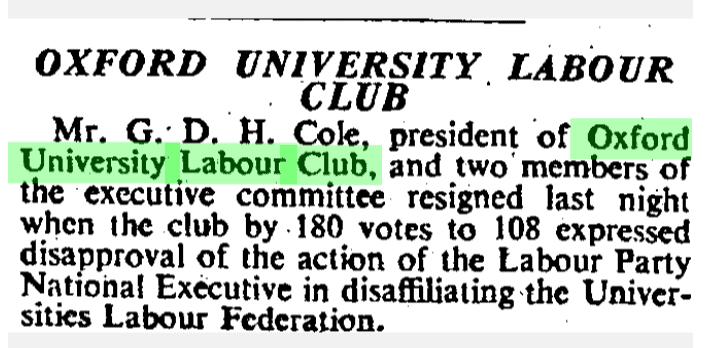
In 2019, Oxford University Labour Club voted to disaffiliate itself from the National Organisation of Labour Students (NOLS) in protest to how the recent NOLS elections had been run, and in solidarity with other Labour Clubs who had been forced to disaffiliate on the basis of not having enough members. These Labour Clubs were told that if they did not have ten paying members, they would automatically be disaffiliated from NOLS, which affected smaller Labour clubs such as Oxford Brookes Labour Club, which has close ties to Oxford University Labour Club. Other University Labour Clubs followed suit, and the pressure led to the National Executive Committee of the Labour Party instead forcing NOLS to disaffiliate itself from the party.
If you can keep up with who disaffiliated from who, you’ll be able to deduce that this situation is similar, though in contrast, to the issue of the student wing in 1940. In 2019 we proudly wave the anti-NOLS flag unanimously as a Labour Club, but in 1940 the issue was far more contentious. I have consequently found primary sources which report upon the fallout from this decision by the NEC in the 1940s. Articles in The Times, for example, presented this as a controversial issue, which accorded dissent with one faction of the party. In contrast, the issue is today fairly non-factional within our Labour Club and other Labour Clubs across the country. The same issue is also reported in The Telegraph Historical Archive, which focuses more on divisions within the Oxford University Labour Club. It claims specifically that the then-President of the Club resigned, alleging that the Club was “moving towards communism”.
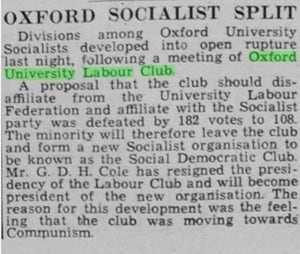
Speakers at the Labour Club
Whilst these factional disputes have inevitably been significant, there is a great deal more to the history of the Oxford University Labour Club. The organisation has a long tradition of hosting speakers, many of whom have been interesting – some controversial. The Times Digital Archive again sheds light on some of these historic speakers, and reported upon them with particular frequency during the Attlee years of government. One result from a quick search of the Club on Gale’s cross-search platform shows that John Strachey, a former minister in the Attlee Government, was a subject of particular controversy; on one occasion, the lights were cut during his speech in protest against the platform he’d been given, leaving him speaking in the dark! He continued with his speech regardless, and the event drew national publicity as a result.
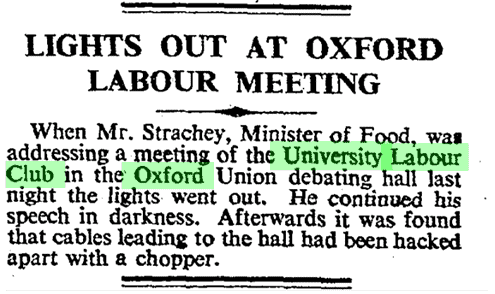
An avid promoter of equal rights
Finally, though the divisions and controversies of the club are fun to explore, the Labour Club has a much more serious (and positive) history which comes from its role as a political society on the left. The Club has been an avid promoter of equal rights for minority groups. Whilst this makes the Club’s antisemitism crisis of 2016 all the more disappointing, the club has always strived to promote equality and does to this day. Some of the most interesting reports of the early Oxford University Labour Club discuss its support for women, at a time when studying at Oxford as a woman was a significantly different experience than it was for men. Indeed, The Telegraph Historical Archive shows that the first woman to ever speak at the Oxford Union was co-chair of the Labour Club. This shows that Oxford University Labour Club was significantly ahead of its time, and had women leading the club before some societies even allowed women to address their members.
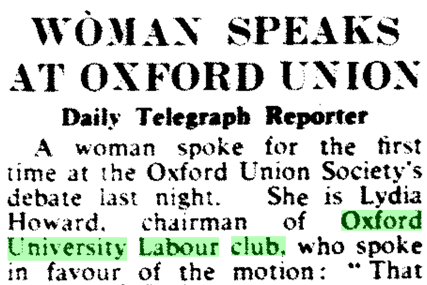
University societies and the activities they entail all have their own unique history, and the potential to research them using Gale’s primary sources online is one I hope will be as tempting for you as it was for me. Therefore, I implore you, if you are, like me, sat in your university library looking for an excuse not to do your degree work, type your student society into Gale Primary Sources – who knows what will come up!
Blog post cover image citation: Author’s own, taken in Oxford, February 2019.

